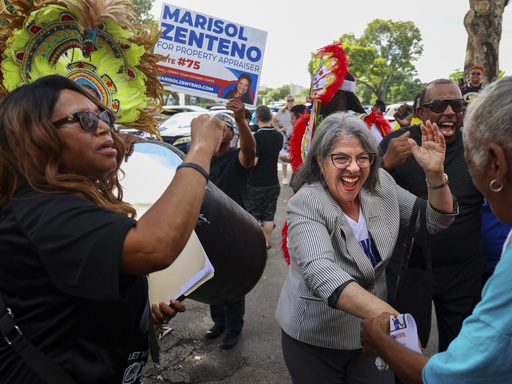MIAMI — In a concerted effort to enhance Black voter participation prior to the upcoming Election Day, various initiatives, including concerts and community celebrations held at polling locations, have been launched. Additionally, mobilizations like “Souls to the Polls” following Sunday services and high-profile events featuring celebrities, business figures, musicians, and activists aim to galvanize support from Black communities.
The importance of Black voter turnout in the 2024 elections has garnered significant attention due to the critical role this demographic has played in past elections for federal and state offices. Vice President Kamala Harris has prioritized engaging Black voters as a central aspect of her campaign messaging and policy agenda. On the other hand, former President Donald Trump has been actively trying to appeal to this vital voting group through unconventional and at times contentious tactics.
A prominent tactic in the outreach by Harris and the Democratic Party involves the participation of former President Barack Obama and his wife, Michelle Obama, in key battleground states. Their goal is to connect with skeptical or indifferent voters, urging them not to abstain this election. This weekend, the Democrats engaged in extensive grassroots campaigning, with activities spanning from door-to-door outreach in cities like Atlanta, Detroit, and Philadelphia to large rally events. Michelle Obama sparked enthusiasm among voters in Norristown, Pennsylvania, with Grammy-winning artist Alicia Keys joining her, while Barack Obama made appearances in Milwaukee.
Michelle Obama emphasized the power of voting, stating, “I’m always amazed at how little so many people really understand just how profoundly elections impact our daily lives. Because that’s really what your vote is, it is your chance to tell folks in power what you want.”
Community-level efforts have prominently featured initiatives like “Souls to the Polls.” In Miami, attendees from local churches gathered at the African Heritage Cultural Arts Center and marched to an early voting location, aiming to inspire others to vote. Regina Tharpe of Miami mentioned that their presence fosters excitement within the community. Sharina Perez, a new voter, expressed her motivation to vote was driven by aspirations for herself and future generations, alongside her mother’s influence.
Organizers emphasizing the need for increased turnout among Black voters often confront challenges of fatigue and skepticism about the political system, particularly among younger demographics. Nevertheless, there remains cautious optimism about the impact of their initiatives. Jamarr Brown, executive director of Color of Change PAC, noted that reaching out directly to communities is essential, stating, “If you want the people who are going to be most impacted to come out, you have to go where they are.” His organization has employed text messaging and digital platforms to reach over 8 million voters across several crucial states in the previous month.
Various events have adopted a more festive atmosphere as well. For instance, the Detroit Pistons organized a community “Pistonsland” festival in a largely Black neighborhood, featuring live music, carnival games, and food trucks near a polling location. Karl Patrick, a festival attendee, shared his political preference while acknowledging his friends held differing views.
Currently, Black voters represent the most consistently Democratic demographic in the United States. However, this election cycle, the Trump campaign has increasingly targeted Black voters, particularly Black men, in an effort to capture a larger segment of their support. The campaign has focused on economic issues, making claims about undocumented immigrants affecting job opportunities for Black individuals, a stance contested by economists.
As the election date approaches, early voting has commenced with millions of Americans participating, including many Black voters across states like Georgia and North Carolina. Representative Hank Johnson from Georgia discussed turnout in this area, cautioning about how certain strategic messaging within the Trump campaign has influenced voter rates. He noted that while Black voter turnout had slightly dropped in earlier phases, the situation might improve as Election Day looms.
Longtime Black community leaders remain hopeful that an array of outreach efforts will inspire increased voter turnout. Rev. Wendell Anthony, a pastor and prominent NAACP leader in Detroit, acknowledges the persistent disbelief among some regarding the impact of voting but remains confident that a significant number will engage in this pivotal moment.
The tireless campaigns and heartfelt messages aim to empower Black voters, reminding them of the weight their votes carry in shaping the future.



